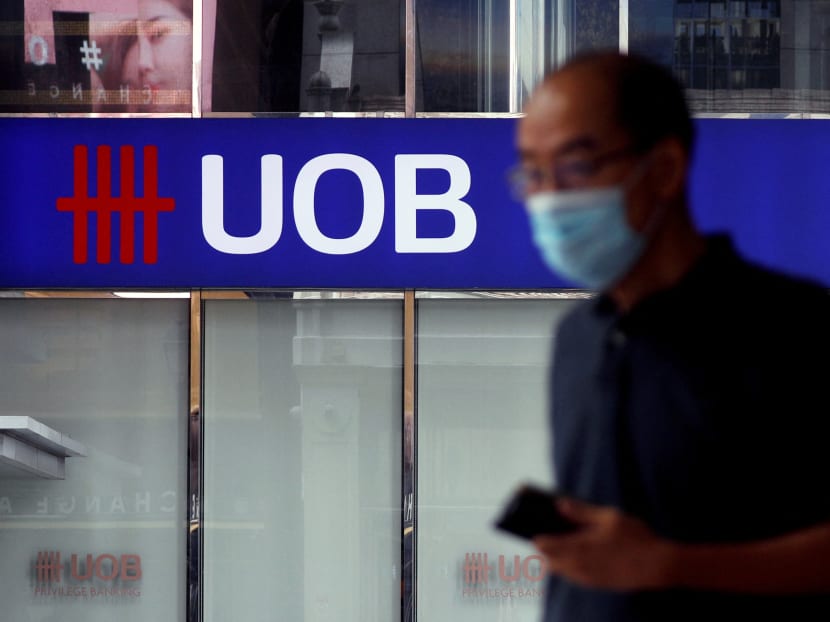UOB to 'kill 4 birds with 1 stone' by acquiring Citibank's operations in the region for S$5b
SINGAPORE — United Overseas Bank (UOB) will be acquiring the consumer business of Citibank in four countries for around S$5 billion, in a move that would propel its status to a leading retail bank and card issuer in these markets in one fell swoop, the bank’s executives said on Friday morning (Jan 14).

- United Overseas Bank (UOB) is expected to complete its acquisition of Citi's assets in Malaysia, Thailand, Indonesia and Vietnam by 2024
- The deal will significantly raise the bank's presence in the region and double its customer base in these countries, said UOB executives
- Citi had decided to exit 13 markets last year as it could not achieve the scale it needed to compete in these regions
- But UOB's chief executive Wee Ee Cheong said his bank has been aiming to scale up for some time
- Citi's exit thus gave UOB an opportunity to capture four markets in Southeast Asia in one stroke, said Mr Wee
SINGAPORE — United Overseas Bank (UOB) will be acquiring the consumer business of Citibank in four countries for around S$5 billion, in a move that would propel its status to a leading retail bank and card issuer in these markets in one fell swoop, the bank’s executives said in a press conference on Friday morning (Jan 14).
Its winning bid to take over Citi’s assets in Malaysia, Indonesia, Thailand and Vietnam is expected to double its retail customer base there to 5.3 million altogether, moving forward its customer base targets five years ahead of time.
When the acquisition is completed around early 2024, UOB will serve approximately 10 million customers in Singapore and the region, said UOB.
The move follows Citi’s announcement last April to exit its consumer banking franchise in 13 markets, though it continues to retain its Singapore assets. It had said then that it did not have the scale it needed to compete in these markets.
In a call with the media, analysts and investors on Friday, chief executive officer of UOB, Mr Wee Ee Cheong, described the deal as "transformational" for the bank.
He said the bank has had long-term ambitions of scaling up and has been on the lookout for such opportunities.
He added that Citi’s “quality and complementary portfolio” is the right strategic fit for UOB, allowing the bank to serve customers through its digital banking platform and meet the financial needs of Southeast Asia as people grow wealthier in the region.
“Even for Citibank, it took them 50 years (to scale up in the four countries),” said Mr Wee, who is also UOB’s deputy chairman. “This is a perfect time, especially during the Covid-19 situation, that it gives us an opportunity to look at our portfolio.
“We are given an opportunity to, with one stone, kill four birds in four countries. What more can you ask for?”
The acquisition is expected to include 5,000 Citi employees in the four countries, including senior leadership and experienced staff members.
Of the 5,000 employees, around 61 per cent are in sales, while 38 per cent are technical and operation staff. Some 36 per cent of the staff have worked at Citi for more than a decade.
When asked if the deal would lead to any retrenchments of former Citi employees, Mr Wee said he considers them to be an asset to UOB due to their wealth of experience, and a committee has been formed to work with Citi on staff movements.
The bank is focusing on integration with Citi’s portfolio at this point in time, he added.
“Good portfolios are run by good quality people. So there is no reason for me to talk about cutting costs. We are here to engage them in a meaningful way, we are here to welcome them,” said Mr Wee.
The bank executives also assured Citi’s existing customers that it will be business as usual, and that Citi is still present to serve their needs during the transition.
Explaining the financial impact of the acquisition on UOB, its group chief financial officer Lee Wai Fai said UOB is estimated to uplift its income immediately by S$1 billion after the acquisition, amounting to about a 10 per cent increase.
The S$5 billion deal will be fully funded by the bank’s excess capital, which will have a “manageable” impact on UOB’s capital position. UOB is also “comfortable and confident” in its ability to maintain its 50 per cent dividend payout ratio.
“The deal will deepen UOB’s capabilities, and scale up in products and markets that the bank understands well,” said Mr Lee.
The acquisition does not change its geographical focus as Singapore will continue to be its main market, he added.
Maybank lead analyst Thilan Wickramasinghe told TODAY that the move appears to be a good one for UOB, given its interests in expanding within Southeast Asia.
In comparison, its rival DBS has primary overseas markets in North Asia and India.
Asked why the bank would move into a business area that another bank has backed out of, Mr Wickramasinghe said that Citi is a global bank with growth engines vastly different from UOB, which is more focused on retail.
"I think the deal is quite synergistic with UOB's strategy to grow within Southeast Asia — its integrated business on the wholesale banking side, its digital banking services with UOB TMRW, all dovetails well with the regional business that they are acquiring from Citi," he said.
He noted however that it is too soon to tell if UOB will become a household name as a regional bank serving customers in Southeast Asia.











